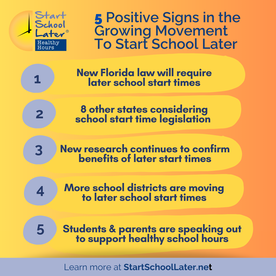|
Growing alarm at the teen mental health crisis along with post-pandemic learning loss is spurring more and more leaders into action  (Severna Park, MD) Decades of research show that when school days start later for middle and high schoolers, students get more sleep, feel better, and perform better – in class, with friends and family, and behind the wheel. Here are five recent developments in the U.S. movement to start school later. 1. New Florida law requires later school start times. This year, Florida joined California in passing a statewide law to require public middle schools to start no earlier than 8:00 a.m., and high schools to start no earlier than 8:30 a.m. California’s law was implemented in 2022. “Having two states with such different political cultures set these laws marks a watershed moment in the start school later movement. It's also evidence of the good that comes from putting kids before partisan politics,” said Terra Ziporyn Snider, PhD, co-founder and executive director of Start School Later, Inc. 2. Policymakers in eight other U.S. states are considering legislation related to healthy school start times. A minimum statewide bell time will help districts prioritize children’s health and well-being while respecting local control of specific schedules. The teen mental health crisis demands urgent action, and mountains of evidence on the harms of student sleep deprivation show that school start times that better align with adolescent sleep needs are a clear factor in improved teen well-being. Pushing back start times to benefit students is one of the most high-impact changes school boards and superintendents can make,” said Terra Ziporyn Snider, PhD, Start School Later co-founder and executive director. 3. Research continues to confirm the benefits of later school start times. Every year, new peer-reviewed studies show that later school start times improve students' sleep quality, mental and physical health, and ability to focus in school. Among researchers’ findings in 2023 alone:
4. More school districts are moving to later school start times. Academic research and the experience of districts that have successfully changed start times are helping build the case for healthy hours. School boards and superintendents are acknowledging the importance of initiatives like later bell times to improve student health, and developing plans to start school later. Just a few of the districts announcing or implementing healthy school hours in 2023: Anchorage School District (AK), Jefferson County Public Schools (Louisville KY), Howard County Public School System (MD), Ridgewood Public Schools (NJ), Albuquerque Public Schools (NM), Lower Merion School District (PA), and Evergreen Public Schools (WA). In a 2023 message to parents after announcing later start times for high school students, Albuquerque’s superintendent wrote, “Our new Board of Education and members of our community are demanding that we be bold and that we take steps to improve our academic outcomes. While this new schedule won’t magically get us to where we need to be, I feel that it is an important step toward putting our students first and setting them up for success.” 5. Students and parents are speaking out in support of later school start times. Students feel and parents see the effects of teen sleep deprivation, exacerbated by school start times as early as 7:00 a.m., and are putting pressure on their schools to prioritize student well-being with healthy school hours. Said former Start School Later high school chapter student leader Zorianna Petrosyan, “I feel like there’s a lot of different policy issues that people talk about in education but this doesn’t always get talked about on a large scale…I just want to just shake people and be like, ‘This is something you should definitely care about.’” And asks high school student Jose Santana, “School start times are a policy choice. Who's calling the shots when it comes to school start times? Is student health and well-being even on the agenda?” “We sometimes forget that sleep is essential for every aspect of human functioning – including growth, development, physical health, mental health, and learning,” said Snider. “And the reality is that most teenagers – no matter what time they go to bed – simply cannot get adequate or adequately-timed sleep if school starts too early in the morning.” While some education leaders cite logistics and adult inconvenience as reasons to maintain too-early school start times, they don’t deny the harm being done by not changing, or the extensive evidence and expert guidance that later school start times can vastly improve teens’ physical and mental health, safety, and school performance. “Pushing back start times to benefit students is one of the most high-impact changes school boards and superintendents can make,” said Snider. “The leaders who have implemented healthier school start times report that the change is transformational. Students are more alert and awake during class. Parents report that their children are happier and easier to get along with. “It can be done. And it's worth it." [1] Bastian, Kevin C. & Fuller, Sarah Crittenden, “What new research tells us about elementary and middle school start times.” https://www.brookings.edu/articles/what-new-research-tells-us-about-elementary-and-middle-school-start-times/
[2] James, S. A., Erickson, D. J., Lammert, S., & Widome, R. (2023). School start time delays and high school educational outcomes: Evidence from the START/LEARN study. Journal of Adolescence, 95, 751–763. https://doi.org/10.1002/jad.12151 [3] Cowan, Benjamin W and Jones, Todd R and Swigert, Jeffrey M. "Parental and Student Time Use Around the Academic Year." National Bureau of Economic Research," April 2023. https://www.nber.org/papers/w31177 Comments are closed.
|
 RSS Feed
RSS Feed